A letter from Dean and Distinguished Professor Krishnaswami "Hari" Srihari
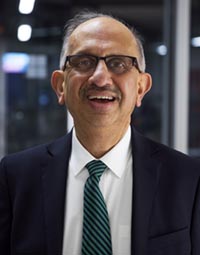
Dear colleagues,
As we begin a new academic year at Watson College, I am overwhelmed at all that you and the Watson team accomplished last year and would like to take a moment to say thank you and reflect on all of the achievements.
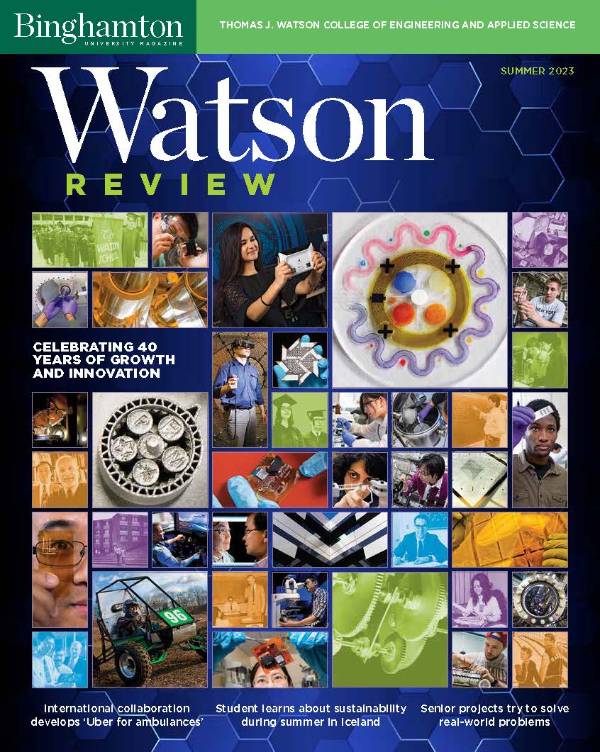
Watson is celebrating its 40th anniversary this year (2023-24), and I am amazed at how far we have come in a short amount of time. As I said at our 40th anniversary kickoff event, we stand on the shoulders of giants – those that had the vision to begin a school of engineering, technology and applied science and those that stood up for the school, creating the foundation of what Watson is today.
As of fall 2022, Watson had 3,404 students with research expenditures at a per capita amount that is over $255,000 per tenured/tenure-track faculty member (2022-23). Over the last 10 years, our doctoral student enrollment has grown by 81% (2013 to 2022) and our committed funds have increased by 123% over the last three years. Watson’s SAT scores for first-year students continues to be the highest on campus, with computer science being the most competitive program for admission. The fall 2022 (entering) class of engineers had an average SAT score (math and verbal combined) of 1419, and the class of computer scientists had an average SAT score of 1449.
This annual letter provides me with the opportunity to highlight numerous initiatives and activities that have enabled Watson College to excel, including diversity initiatives, student excellence, international partnerships and graduate recruitment efforts, and research opportunities.
Student and faculty growth
The college continues to grow in student enrollments and, therefore, faculty numbers. This coming year, Watson will welcome 15 new tenure-track faculty members: 13 for fall 2023, two for spring 2024.
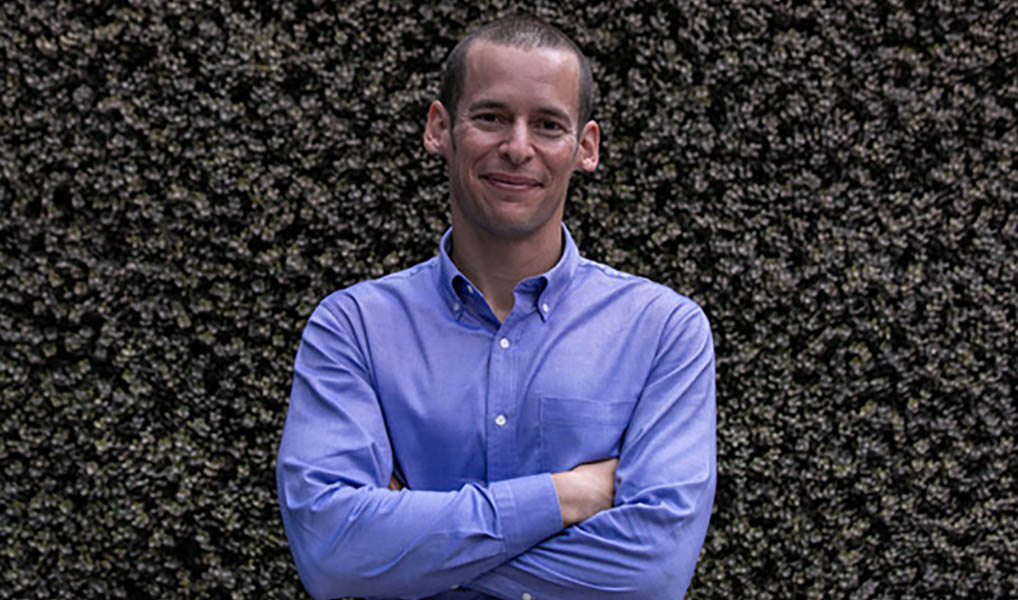
As part of an Empire Innovation Program award from SUNY, Watson was authorized to hire three professors with expertise in artificial intelligence for improving health outcomes and the healthcare system. The first of these new hires is Carlos Gershenson, who was a professor at the Universidad Nacional Autónoma de México in Mexico City. Gershenson will join Watson College’s Department of Systems Science and Industrial Engineering this fall. As you know, EIP hires are aimed at bringing excellent researchers and scholars to campus to build and grow a research program. They are an awesome opportunity to elevate our research program in Watson even more.
Watson College continues to work hard to grow student enrollments at the undergraduate and graduate levels, in both quality and quantity. In fall 2022, Watson College had 2,145 undergraduates and 1,259 graduate students. That is a 25% increase in total student enrollment since fall 2013; a 55% increase in graduate student enrollment.
We could not accomplish all that we have without the unwavering support of our campus leadership and partners, including President Harvey Stenger, Provost Donald Hall and all of our campus partners whose support of Watson College has been crucial to our achievements. This support enables us to provide the best opportunities for the students we serve, as we continue to grow strategically and with quality.
Watson College is also privileged to have active and dedicated advisory boards that provide invaluable support and guidance. Thank you to all of our Watson Advisory Board members, members of our department advisory boards and our New York City Metro Advisory Board for their service. Your contribution to and advocacy for our college is invaluable.
As the college grows, our commitment to the student experience and success is even more of a priority. Watson Advising was focused on increasing student engagement with their office and assigned advisors last year. These efforts were to create a personalized experience for our students with the hopes of a stronger relationship with their advisor as well as a better and more successful student experience. Community-building also was a strong focus this past year for Watson Advising, and the Learning Community remained active last year with more involvement planned for the upcoming year.
As stated by Director of Undergraduate Advising Jennifer Drake-Deese: “By promoting a ‘point of first contact,’ Watson Advising encourages students to come to our office for any questions, academically related or not. When students know where we are and feel welcome, they will be more apt to reach out to us when something arises. Often students don’t know all the resources available to them; if the only resource they remember Is Advising, we can connect them to the rest.”
For the upcoming year, Watson Advising looks to expand tutoring available for Watson key courses. A graduate assistant will join the team and focus on first-year probation students. As we continue to rebound from pandemic years, there is currently at 91% retention rate through the first year of engineering.
Labs and technology
In addition to advising services, the opportunities for hands-on project work in the college’s Fabrication Lab in the Engineering Building also continue to strengthen and expand, including an inaugural design and build Watson Fabrication Lab electric go-kart. This lab provides an excellent platform offering workshop opportunities such as welding, fabrication and electrification. The Fabrication Lab also provides workshops and training for students in welding, soldering and Fusion 360 (a new Watson micro-credential course).
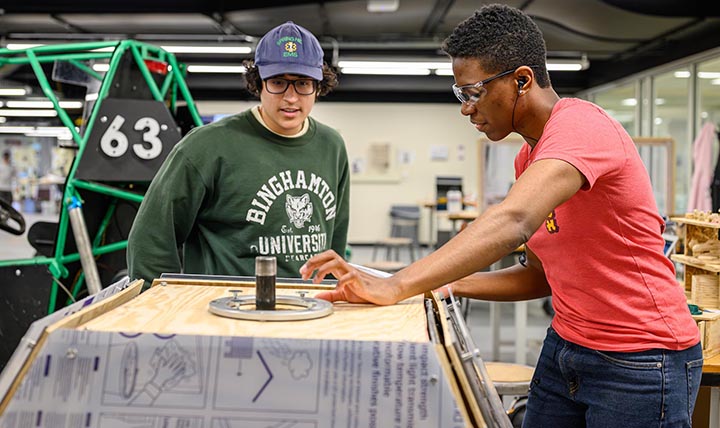
The equipment in the Watson Fabrication Lab expanded and now includes a Haas CNC lathe and Prusa 3D Printers. In addition, John Guernesy, a new instructional support technician for the Watson Fab Lab, was hired; the team is currently in the process of securing another instructional support technician. In its second year, the Fab Lab Apprentice Program expanded with three additional Watson Student apprentices. Senior Design instruction also received support from the lab – the team conducted more than 100 design reviews and completed over 30 jobs in support of faculty research projects.
In 2022-23, the ongoing Autodesk partnership continued. The Autodesk educational resource team supplied full support for Fusion 360 training for students, faculty and staff. The collaboration with Autodesk included identified student ambassadors for Binghamton to provide on-site support for students and staff using Fusion 360. Several training sessions for additional software via Zoom also occurred – CAM, Nesting, 3D printing, generative design and analysis/simulation.
Undergraduate laboratories experienced several upgrades, including computing upgrades for Computer Aided Engineering (CAE), First-Year Engineering (EDD) and Mechanical Engineering (LNG-707) Laboratories.
To improve research and research infrastructure, the Nanofabrication Facility (Clean Room) is being updated under new leadership. Weili Cui, the facility’s new manager, will be directing operations for the Clean Room, including devising plans for repairs and improvements to enhance use among Watson faculty and students.
All indications are that the University will assign approximately 6,200 square feet of lab space to the Biomedical Engineering Department, which is anticipated to be available in spring 2025 after the BioFilms group is relocated to new space on campus. In addition, a team in the Watson Dean’s Office, led by Senior Associate Dean Peter Partell, conducted a space study to ensure the effective utilization of the college’s office and laboratory space. This analysis is critical as Watson grows – we have to be flexible and innovative in this area and work as a team for the advancement of our college.
Watson College continues to utilize a virtual desktop environment to support the college's academic and research mission. Students can access state-of-the-art engineering applications from anywhere via a broadband network connection; the application resides on a physical server in the Data Center. This environment provides equal access to all of our students regardless of the type of computer used to connect to the environment. In addition, the Watson IT group upgraded the computers in academic laboratories for the Engineering Design Division, Systems Science and Industrial Engineering, and Electrical and Computer Engineering faculty offices. The servers supporting virtual desktops were replaced, providing a much-needed performance boost.
The IT staff performed critical maintenance, such as replacing the batteries in the uninterruptable power supplies that protect the college’s Data Center. The IT team is deploying new thin clients in the Computer Aided Engineering and Mechanical Engineering academic laboratories.
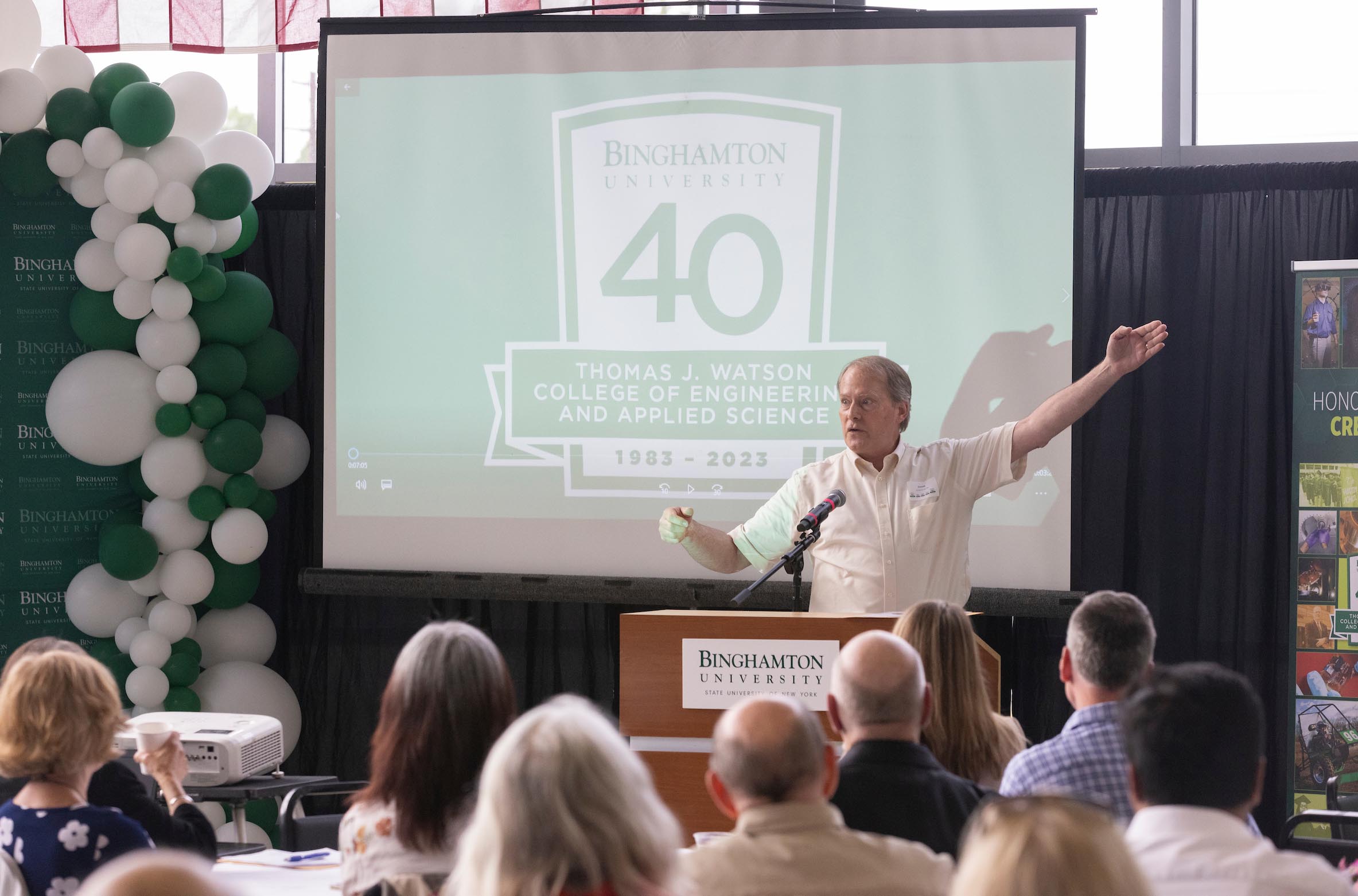
I am also delighted to announce that Director of Information Technologies Don Kunkel received recognition for Distinguished Service by the Professional Staff Senate. Congratulations, Don!
Student organizations
Our students continue to demonstrate their excellence through participating in various competitions and conferences. The Binghamton University Rover Team participated in the University Rover Challenge (URC) in Utah. The team placed 23rd out of the 37 finalists who attended, which is outstanding considering it was their first time competing against schools that have been attending for a decade or more. To put this further into perspective, Binghamton was chosen as one of 37 finalists from among 104 teams from 15 countries, beating out teams from schools such as Lehigh, Berkeley and Georgia Tech to earn the right to compete. At the competition, the team outscored the Cornell team, which has been competing for several years.
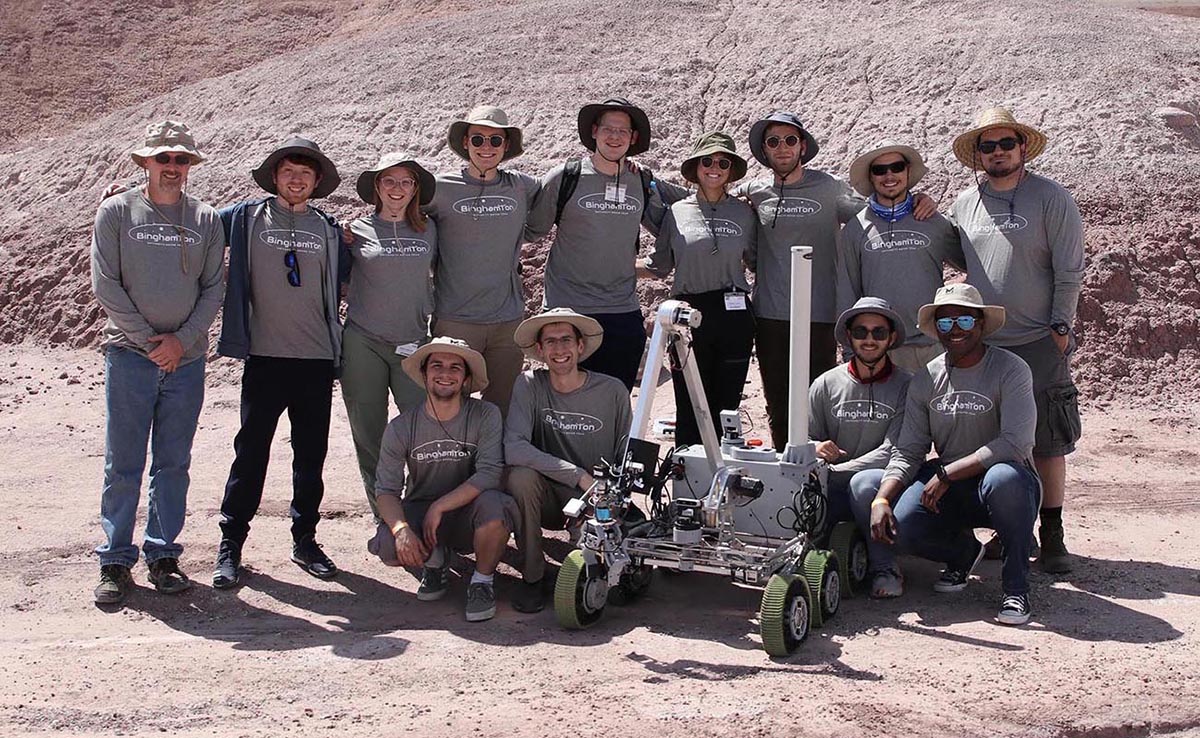
Thank you to the dedicated students who worked extremely hard this year to make this happen and to those students who came before and laid the foundation for this awesome success. And thank you to Professor Doug Summerville, the team’s faculty advisor, who supported them over the last several years, empowered them to reach their potential, traveled with them to the competition and supported them throughout the grueling competition. Thank you as well to all of the faculty and staff who supported the team, including Vince Brady and the staff in the Fabrication Lab. It would have been extremely difficult for the team to achieve this success without the help from donors, including Geraldine MacDonald ’68, MS ’73, LittD ’17, who was their biggest supporter.
Our vehicle teams continued to work hard this year under the astute advice and guidance of Vince Brady and with assistance from the Fabrication Lab technicians. The Watson Combat Robotics League had another successful year, holding team-based competitions. The simulation competition teams from the SSIE Department had another outstanding year competing virtually against top teams from around the globe and competing extremely well at the annual IISE modeling and simulation competition. In addition, the BU Girls Who Code organization continued in-person classes for middle and high school girls interested in technology.
Our student organizations and teams could not accomplish what they do without the support of our alumni, friends and donors. There are many ways to support our students, including the Watson Competes! Program; please visit www.binghamton.edu/watson/giving for more information.
Diversity, equity and inclusion
The Watson Office for Excellence in Diversity, Equity, and Inclusion (WEDEI) had an eventful 2022- 23 academic year. The WEDEI office saw a few changes this year as well with Carmen Jones taking over as assistant dean for diversity, equity and inclusion this summer following Miguel Baique’s departure in the spring. Braxton Perry joined the office as assistant director.
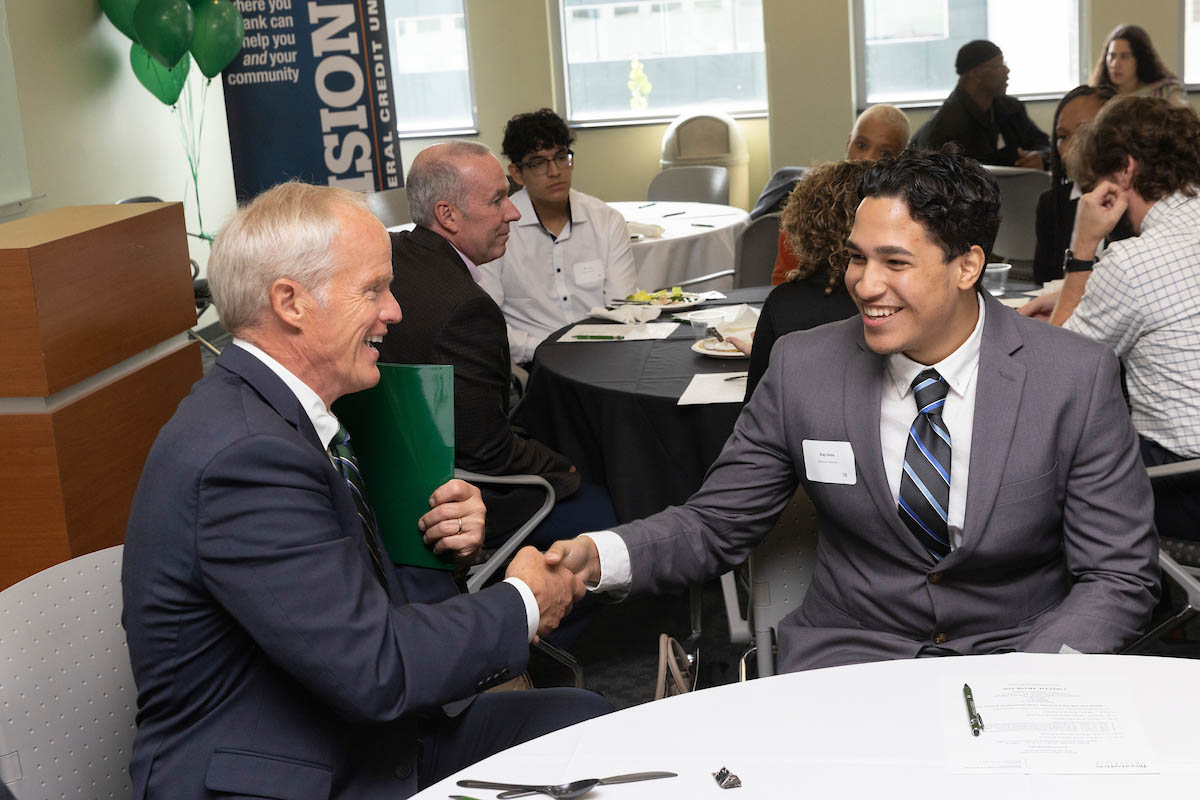
The start of the 2022-23 academic year saw the second cohort of the Watson College Scholars Program join the university. With this cohort, the scholars now represent all the undergraduate departments at Watson College as well as all years, from first-year students to graduating seniors. This year saw our first two scholars graduate — one pursuing a career in automotive engineering and another pursuing a PhD in Computer Science. We look forward to welcoming our third cohort this year, which we could not do without the support of our dedicated donors.
Many other events and programs took place this year. In the fall, we welcomed Peter Walker, a corporate vice president of engineering at Microsoft, to campus for a fascinating discussion on diversity and inclusion in engineering and technology. This spring semester saw the wrapping up of the D-Coding program and the return of our Louis Stokes Alliances for Minority Participation (LSAMP) program, with students participating in summer research experiences for undergraduates here on campus.
In collaboration with the Thurgood Marshall College Fund, Watson College hosted a summit in June with representatives from 6 HBCUs spending 3 days on our campus, resulting in the forming of newERA (New Educational and Research Alliance) creating an innovative opportunity to connect with Alabama A&M University, Central State University, Tuskegee University, Prairie-View A&M University, the University of the District of Columbia and Virginia State University.
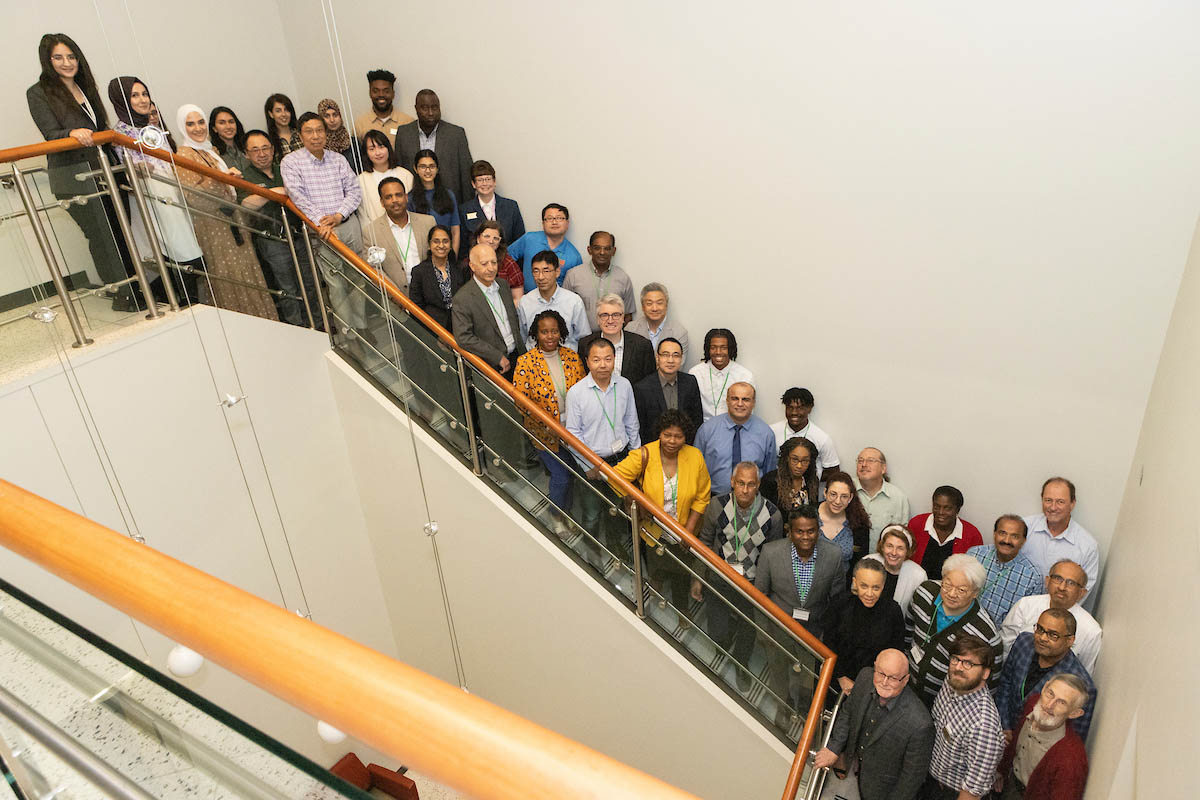
With the goal of beginning long and mutually beneficial relationships, Watson College faculty and staff met with HBCU representatives to discuss ways to collaborate, specifically in focus areas such as artificial intelligence (AI), data science, cybersecurity, materials, biomedical engineering, smart energy, future manufacturing, healthcare and agriculture. In addition to student-focused initiatives, this collaboration will not only enhance the research capabilities of the HBCUs but also foster an environment of knowledge-sharing and collaboration that benefits all partner institutions.
For the 2023-24 academic year, the Watson Office for Excellence in Diversity, Equity and Inclusion is looking forward to welcoming the third cohort of Watson Scholars, the Fall 2023 GEM GRAD Lab, and a re-imagined Engineering Learning Community focused on inclusive design.
Academic programs and partnerships
Our academic programs continue to grow. The online format for all Watson PhD programs received approval from New York State Department of Education and SUNY. United Health Services and the Biomedical Engineering Department signed an agreement for collaborative Senior Design projects. The annual meeting for the Two-Year Engineering Science Association (SUNY TYESA) was held at Binghamton University in October 2022. In addition, preparations for the Fall 2024 ABET EAC visit are underway.
Two new tracks have been added to the Computer Science BS — cybersecurity and artificial intelligence — and the Mechanical Engineering Department is now offering a 4+1 program with Materials Science and Engineering. Growth continues for our 2+2 programs through improvement review, offering pre-departure support as well as presentations to our partners to support recruitment. In addition, Peter Partell worked with Distinguished Service Professor and Chair Weiyi Meng to create a Computer Science Department growth plan, focusing on growth, hiring and resources.
Watson Advising worked with the Computer Science Department to revamp the Intra-university Transfer (IUT) into CS. IUT applicants were also offered a second-choice major for the first time. New transfer students were also offered a second-choice major for the first time, which resulted in an increase in both ISE and BME transfer enrollments.
Academic collaboration continues to grow with our international and domestic partners, including new agreements and research collaborations with all five VIT campuses, Christ University, SUNY Potsdam, NMIMS, RMK Engineering College, SASTRA, PSGR Krishnammal College for Women, Rajalakshmi Group of Institutions, Istanbul Technical University, and Manipal Academy of Higher Education. The academic collaborations range from 2+2 programs to 3+1 and 1+1 programs.
The University of the West Indies Mona Partnership was revitalized. This allowed for ABET accreditation advisement and support, lab review for ABET, enhancement of thr Watson Scholars Global Experience, and an opportunity for joint capstone projects. Thank you to all the faculty and staff in Watson College who work hard to make these partnerships successful, from co-directing research centers to collaborating on research and advising students, in addition to traveling to the partners.
Expanding research
Increasing Watson’s research prominence and its sponsored research continues to be a top priority for us. In FY23, Watson crossed the $20 million mark in research expenditures, reaching $26.3 million, an impressive 32% increase over the last fiscal year. Likewise, committed funds for this fiscal year have hit an all-time high of $42.7 million, a 50% increase over the past year. The value of proposals submitted by Watson faculty also hit another milestone this year exceeding $100 million (the second time in the history of the college).

Another important measure from a research and education perspective is the number of graduate students participating in research. For 2021-22, there were 392 RPA appointments funded by single and co-PI Watson faculty (344 unique appointments). This is a nearly 14% increase over the previous year. As a lead contributor to Binghamton University’s research enterprise and R1 status, Watson College accounted for 36% of the university’s proposals, 22% of its committed funds and 41% of its research expenditures. All five of our academic departments are in the top 11 on campus for research expenditures, with the SSIE Department in first place.
Watson faculty enjoyed several prestigious wins this past year. Pritam Das (ECE), Ahyeon Koh (BME), Tracy Hookway (BME) and Hui Lu (CS), received NSF CAREER Awards for their research on solid-state transformers, cardiac tissue engineering, flexible biosensors, and virtualization in cloud computing, respectively. Congratulations to the awardees!
Watson faculty continue to be “top of the game.” A recent study conducted by Stanford University named 11 Watson faculty as among the top 2% of researchers in their fields in 2021. Watson faculty also continue to receive prestigious external recognition: Yu “David” Liu completed a successful semester as a Fulbright U.S. Scholar at the University of Maribor in Slovenia.
These are but a few examples that illustrate the breadth, depth and cutting-edge nature of the research conducted by Watson faculty. They also underscore our expertise in conducting both foundational and applied “use-inspired” research in national priority research areas of high relevance to our society and economy. Congratulations and thank you to all our faculty who received external grants this year from federal, state, industry and other private organizations. Your contributions to the growth and recognition of the Watson research enterprise are truly valued and appreciated.
Last year, we launched the Accelerate Watson Research initiative to develop a robust strategy, and an action plan to double Watson’s research expenditures to $40 million with a 25% increase in research faculty and a $300,000 per capita expenditure target by the year 2026. I will highlight key activities to date under two key pillars of this growth strategy. First is the establishment of “purposeful partnerships” with academic, federal and nonprofit research and development organizations that will bring synergistic capabilities, increase our competitiveness for external funding and open new doors as well as opportunities for our faculty.
Since the signing of a Memorandum of Agreement last July, significant progress has been made in the partnership with Upstate Medical University, including the launch of collaborative research projects under a jointly funded seed grant program with participants from BME, ME and CS departments; approval from SUNY to hire an Empire Innovation Program (EIP) in regenerative medicine under a joint program with Upstate Medical; submission of a number of joint proposals to the NSF and NIH by Watson and Upstate faculty. Planning is also underway for a joint Institute of Regenerative Medicine with initial focus on pancreatic islets, as is the establishment of courtesy faculty appointments across the two institutions.
Pursuant to a non-disclosure agreement (NDA) signed last year with MITRE Corporation, a nonprofit R&D organization that works across federal, state and local government as well as industry and academia to “solve problems for a safer world,” we have had a series of visits by senior MITRE officials and exploratory discussions between our research teams to identify areas with the highest potential for high-impact collaboration. With a strong appreciation for Watson’s research capabilities, MITRE is now working to finalize a set of MoUs with Watson College and Binghamton University to launch joint research activities in select areas of mutual interest.
Another key and unique partnership is with Griffiss Labs, a nonprofit technology and talent accelerator, and an extended arm of the Air Force Research Lab (AFRL) in Rome, N.Y. An MoU signed with Griffiss Institute furthers access to AFRL expertise and resources, and it opens up opportunities for collaborative talent development and experiential learning programs for our students, development opportunities for our faculty, joint research and venture development opportunities.
Finally, by invitation, Watson College recently submitted a proposal to become a joint venture partner in Data Innovation for the National Technical Information Services (NTIS), a Department of Commerce entity, to support federal agencies in applying data science and engineering to solve mission-critical challenges. We look forward to each of these nascent partnerships to grow into robust, productive alliances that extend and enhance Watson’s impact on society and the nation’s economy, while providing enriching growth opportunities for our faculty, over the coming years.
I must mention with pride and gratitude the invaluable support Watson’s illustrious alumni have provided in championing some of these partnerships, and more broadly, in supporting Watson’s research enterprise in myriad ways.
A second pillar of the Watson research growth strategy that I would like to briefly highlight here is the recently launched Watson Interdisciplinary Research Acceleration effort. Aimed to bring together pockets of unique expertise across Watson departments in line with federal research priority areas, this effort will support research teams in developing and executing strategic multi-year funding pursuit plans with the goal to secure national research centers and institutes in these areas for our campus. Three teams in the areas of Human centered AI and systems intelligence, bioelectronic systems and devices for healthcare, and sustainable semiconductor manufacturing were announced recently. I look forward to the active and enthusiastic participation of our faculty in this effort and many successful outcomes from these teams.
Graduate student recruiting
Watson continues to lead the University in total new graduate students – 534 in fall 2022, 107 in spring 2023; with a record high of PhD students – 438. Currently 403 admitted students for fall 2023 have accepted $1,000 tuition scholarships, with 36 students on the waitlist. Over 2,000 timeslots have been offered by our graduate recruitment team since one-to-one meetings started in October 2020.
Staffing changes have occurred in the Office of Graduate Recruitment: Emily Breitbart, graduate recruiter, left the office for a new position at the University of Rochester; Pam Marten, director of employee and graduate student resources, retired after serving 30 years as a New York state employee. Watson welcomed Johanna Brozinsky in the role of graduate recruiter, as well as Jessica Larson in her new role as the coordinator of employee and graduate student resources.
Fostering faculty excellence
The guidelines and policies of Watson’s five departments for faculty tenure and promotion experienced a substantial review by Associate Dean for Graduate Studies and Faculty Development Junghyun Cho, with recommendations drafted for Watson College. Current mentoring practices and guidelines are also under review, with recommendations drafted to create a more beneficial policy and experience.
A Watson new faculty orientation was held in August 2022, providing new faculty with resources while emphasizing the importance of research and scholarship to faculty success. A follow-up meeting for first- and second-year faculty occurred in December 2022, which included networking and familiarizing with other staff, discuss funding opportunities and issues/concerns or miscellaneous items new faculty experienced. An evaluation on the return of investing (ROI) of faculty’s startup packages before tenure through research expenditures and space allocations was completed.
Associate Dean for Graduate Studies and Faculty Development Junghyun Cho worked in the Science and Security Committee, organized and led by the Provost Hall (fall 2022 to spring 2023) to get ready for NSPM 33 implementation guidance. This committee worked on four subtopics of (i) incoming visitors, (ii) foreign travel, (iii) research security and export control training and protocols and (iv) cybersecurity.
In addition, the ad-hoc High-Performance Research Computing (HPRC) committee held monthly meetings (fall 2022 to spring 2023) to get feedback from the Watson’s five departments to review and plan out the cluster’s activities in preparation of Spiedie 2.0. Committee members include Don Kunkel (Watson IT), Phil Valenta (Watson IT), Ling Wang (BME), Ken Chiu (CS), Jessica Fridrich (ECE), Xin Yong (ME), Sang Won Yoon (SSIE), Junghyun Cho (Watson). Watson also participated in the America East (AE) Faculty Speaker Series.
Three Binghamton University faculty were promoted to the ranks of distinguished faculty – all from Watson College. A tremendous achievement for our university - as well as the Watson College. A well-earned congratulations to Mohammad Khasawneh and Kaiming Ye for being promoted to SUNY Distinguished Professor; as well as Weiyi Meng for his promotion to SUNY Distinguished Service Professor. As you know, the promotion at the SUNY level to the distinguished distinction is a very big accomplishment and not easily obtained. It is truly an honor to serve our college among them.
Awards
Congratulations also goes to the recipients for the 2023 Watson College Recognition Awards and the 2023 Chancellor’s Awards for Excellence. I am overwhelmed every year at the outstanding work done by these individuals as outlined in their nomination dossiers. Thank you to each and every one of these individuals for the work they do for our college.
2023 Watson College Recognition Awards
- Early Stage Distinguished Research: Jeremy Blackburn (Computer Science), Ahyeon Koh (Biomedical Engineering), Bing Si (Systems Science and Industrial Engineering)
- Distinguished Educator: Tracy Hookway (Biomedical Engineering)
- Outstanding Faculty Service: Guy German (Biomedical Engineering)
- Outstanding Staff Service: Kathy Feczko (Biomedical Engineering)
- Distinguished Alumni: Joseph Kolly ‘88; Joseph Mari ‘05, MS ‘07
2023 Chancellor's and University Awards for Excellence
- Chancellor's Awards for Excellence in Teaching: Yong Wang, Systems Science and Industrial Engineering
- Chancellor's Awards for Excellence in Faculty Service: Kartik Gopalan, Computer Science
- University Award for Excellence in International Education: Michael Testani, senior director of outreach and engagement
Outreach to industry
The Office of Industrial Outreach, under the leadership of Mike Testani, has shown continued growth in 2022-23. The Strategic Partnership for Industrial Resurgence (SPIR) program, a vehicle for delivering advanced technical assistance to New York industries aimed towards developing high-technology regions, was supported again this year by providing sponsorship for student and faculty engagement on a number of important industry projects.
SPIR supported 22 PhD and MS semester-based projects throughout the Southern Tier in 2022-23. Watson faculty and students delivered real business value to our partner companies. SPIR continues to be a vibrant program going into its 29th consecutive year; current plans include supporting the same number of semester-based projects over the next academic year. This allows for several new startup companies taking up residency at our Koffman Southern Tier Incubator.
The Watson Continuing Professional Development programs continued to grow offering over 50 courses in 2022-23 (via online, on-campus and private offerings), reaching over 1,100 course participants. The online Lean Six Sigma offerings continued to be very successful, with White Belt, Yellow Belt, Green Belt, Green Belt Healthcare, and Black Belt courses; these courses were delivered to 355 unique learners — an increase over the prior academic year.
Several new online programs were launched during the 2022-23 academic year, such as Engineering Management, Quality Management, Data Science Essentials and Data Science Advanced Learning Suites. Since Watson’s microcredential program started (the first at Binghamton) in spring 2018, over 3,700 badges have been issued; 674 digital badges were issued to learners during the 2022-23 academic year. The Watson Professional Development courses were provided to McNair Scholars and D-Coding (Diversifying Coding) students as well as to new Watson graduate and 2+2 students.
For our workforce development initiatives, Watson made significant gains. Following a $50,000 grant to enable Women in Apprenticeships for Non-Traditional Occupations (WANTO) that reach over 120 female-identifying students, we have engaged in the EXCITE grant program also offered through the Department of Labor. This program is focused on building IT and cybersecurity competencies across all demographics. To date, this program has enabled 145 students to participate in our IT-related professional development programs.
Finally, the Watson Outreach Office is receiving funding in support of the Build Back Better Regional Challenge (BBBRC), where the Binghamton University-led coalition was awarded $113 million. Binghamton and Watson College are leading the deployment of the New Energy New York (NENY) Battery Academy as a key component of the broader NENY program. To support this effort, Astrid Stromhaug was promoted to program manager for the NENY-BA, where she will supervise several new employees. These welcome additions to the Watson team include Maria Vail (administrative support), Jenny Jacoby (marketing specialist) and Connor Pierce (instructional designer). After a successful pilot of our battery technician and battery expert programs in spring 2023, the team will be launching new and improved programs in fall 2023.
Connecting with employers and alumni
The Watson Career and Alumni Connections Office (WCAC), under the leadership of Director Kimberly Eiche, continues to serve students and recent graduates year-round through 1-on-1 career consulting appointments, professional development workshops, classroom presentations and other initiatives to connect Watson alumni and current students. In the 2022-23 academic year, the staff served over 1,000 unique students through personalized appointments (to discuss topics such as job/internship search, professional resume, cover letter, LinkedIn profile, interviewing strategies, networking tactics and/or graduate school application, among other career-related topics as desired).
The WCAC has steadily grown its industry connections, currently nearing 400 companies, which is more than a 50% increase from the prior year. Through these connections, new job and internship pathways are continually established for our Watson student population.

In fall 2022, WCAC offered its first in-person Watson Career Expo, a recruitment/networking event that attracted 50 companies and over 600 Watson students. The WCAC team also led the coordination and execution of Engineers Week in February 2023. Two signature events concluded the week of programming. First, the Alumni and Friends Reception featured keynote speaker John Contrata (MS ‘95), and our annual Community Day attracted 676 participants. This included 229 Watson student organization members hosting interactive STEM activities for 199 children and 224 parents at the Innovative Technologies Complex. A big “thank you” to all of the sponsors who made Engineers Week 2023 possible!
Our Watson student outcomes for the Class of 2022 were higher than all other programs at Binghamton University, with an undergraduate placement rate of 95% and an average starting salary of $83,159. The graduate Class of 2022 (MS, PhD) attained a placement rate of 93%, with an average starting salary of $95,120. This information will positively contribute to the University’s ranking as a Top 20 Best Career Placement public school institution by the Princeton Review.
Donations and development
The development program at Watson College has had one of its best years ever as far as raising support from private sources.
Watson ended FY23 up in dollars, but down in the total number of donors. The increase in dollars can be attributed to major gifts from Gary Kunis ’73, LHD ’02, and Connie Wong to establish the K. Douglas Hsu Research Laboratory in the Biomedical Engineering Department, and from Keith D. Walter Sr. ’74 for the Pat Walter Memorial Scholarship.
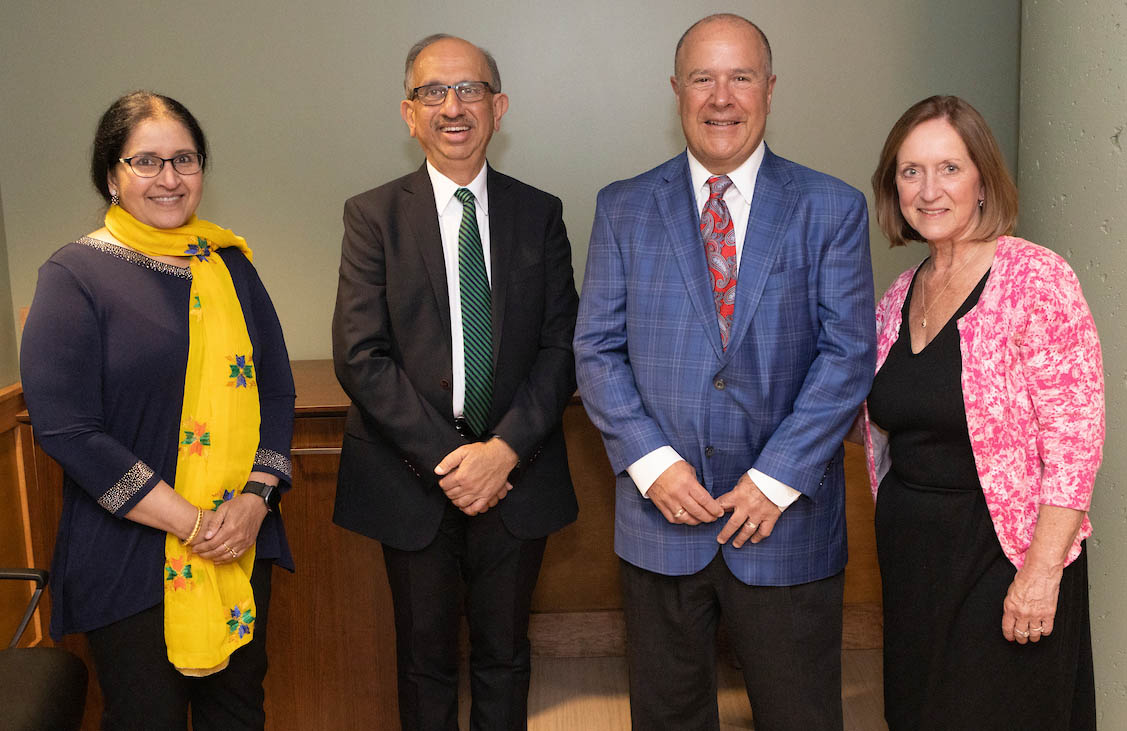
In addition, John and Cheryl Mirabito named the Krishnaswami “Hari” Srihari Executive Boardroom in the Engineering Building, which will provide resources for the Watson College Scholars Program. Support of the Watson College Scholars Program continued from private and corporate partners. Every dollar counts as these resources are vital to the growth of our college and education of our students.
As always, our Watson Team continues to exceed expectations through its diligence, dedication, innovative approach, entrepreneurial spirit and ambitious drive. We remain focused on providing the highest-quality educational opportunities to our principal customer – our student. It is indeed an honor to be a part of this superb and accomplished team. I would certainly be remiss if I did not thank each member of the Watson team for all that you have done and continue to do for our Watson College. I look forward to a phenomenal 40th year of innovation in 2023-24!